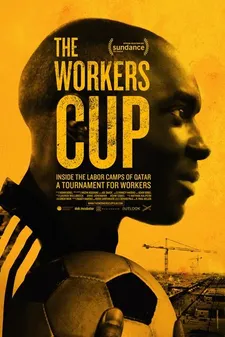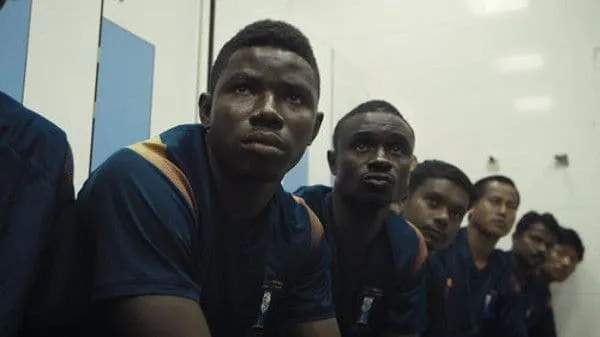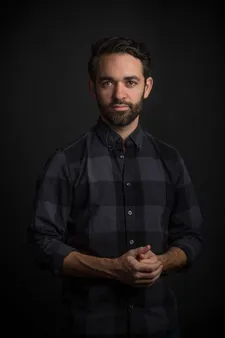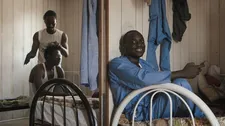The fifth edition of the Qatar Workers Cup – a tournament set up for those who are working to build the stadia for the 2022 World Cup – got under way in the country on Friday, with organisers promising it would be “bigger and better than before”. The contest, which runs across the next six weeks, will see 32 teams of immigrant workers, vie for the title on many of the pitches they have constructed.
Ahead of this year’s event the Supreme Committee for Delivery & Legacy director of communications Fatma Al Nuaimi said: “The SC is proud to be supporting the Workers Cup for a fifth year given the joy it brings to both those who participate and their colleagues and friends who attend as fans.
“We are confident the 2017 edition will be as effective as previous tournaments have been at uniting Qatar’s diverse migrant communities into one footballing community, demonstrating this sport’s power to bridge cultural differences and bring people together.” It's an upbeat message and one that offers a positive spin on construction work and working conditions that have attracted all the wrong sort of coverage in recent years, particularly in terms of the living standards suffered by the workers. Adam Sobel’s documentary The Workers Cup – which premiered at Sundance Film Festival this year - steps into the world of the 2015 Workers Cup, as seen through the eyes of workers of the Gulf Contracting Co, who get the chance to channel their off-hours energies into the tournament. As Sobel puts it: “Workers’ welfare and corporate responsibility are terms that get thrown around a lot in the country and they carry some heavy ethical subtext that I hope the film investigates in an interesting way.”
Sobel – an émigré to Qatar himself, where nine out of ten of the residents are from somewhere else - was no stranger to the situation for migrant workers, having worked on a number of reports on the conditions at the labour camps. He says: “Once Qatar won the right to host the World Cup, it shone a light on the country, which was great in one way for them because they wanted the notoriety and that publicity, but on the other hand, it shone a spotlight on labour abuses and the situation for labour, which they weren’t as prepared for, and that became a big story which we covered a lot.”
Sobel says he wanted to break out from the restrictions of the news stories he had been working on, which often had to hide people’s identities or shoot undercover.
“I thought a lot of the media made the workers look like victims and not much else,” he says. “So we were definitely interested in presenting the workers in a way that was much more human and came to the story much more on their terms. We never intended to do an expose, because that had already been done.
“We were interested in following the company in the film because they were bidding and tendering for World Cup jobs and the companies that are eligible to win those contracts are, by nature, are upholding a higher standard than a lot of the other companies in the country because they are under much more scrutiny. So that was interesting to us because we thought, ‘Ok, if we’re operating in the ‘better off’ labour camps and you can still feel the psychological duress these guys are under and the conditions are – well, I wouldn’t use the word squalid, but certainly less than basic, I think that says something. That’s a powerful statement in and of itself.”
The director used his existing connections to get the go-ahead for filming, but initially he found that the workers were sceptical about the camera being allowed access to the camp. He adds: “They thought early on, for maybe the first couple of weeks, that we were in cahoots with the company, so there was a lot of propping up of their bosses. So we just kind of built our relationship around football. We started talking about football and about their love for it and related on that level. Both the producer and myself were fish out of water in the country because we had both come from somewhere else. We’d left our families behind for a job so we could relate to each other on that level and slowly we just let the themes of the film develop over the course of months but we really didn’t talk about any of the deeper things in the film until much later when we’d gained their trust.”
That trust results in the men often revealing their darker fears on camera. In one affecting conversation in the works canteen, we see them talking at length about the notion of freedom, which Sobel says came as a surprise.
“I was worried,” he admits, “because I thought, ‘Nobody’s going to believe that this actually happened’. The truth is, you put a camera in front of people and they are empowered by that. These are thoughts and feelings they’ve repressed and this is their moment to express them. So, I think that’s what happened.
“We were shocked but that was the moment we knew we had a film and, potentially, a really special film, because the conversation flowed so freely and they were so open and generous with their thoughts and we were able to just sit back and observe. And the revelation is really powerful. There was always a sense that any conversation could lead to this very dark place, that you could just start off talking about girlfriends and things like this and all of a sudden you come crashing down to earth.”
Sobel’s film doesn’t invite us to pity the workers but rather to see the situation from their perspective. Many of them were lied to by recruiters and the cup itself, though much enjoyed by the men, still has a problematic element, in that it is used as PR tool and, tangentially, to recruit more workers.
“We knew there was a promotional angle to the cup itself but I don’t think that I expected it to be so present,” says Sobel, “to the point where the people in the film were so aware of it and that was a shame because this was supposed to be such a special moment for them. “
The work on the Cup venues is shown to involve long hours and Sobel shows us how the economic situation means that decisions on whether to stay or go home make things even more complicated.
“Your family is relying on you, your community is relying on you and, to a man, they arrive in the country with a lot of pride. To return home as a failure the idea of that often keeps people in the country. They couldn’t except that.,” says Sobel.
“It’s a really complex decision for them. Even some of the people have gone home but then returned to the Gulf because they need the wages. They are vulnerable. The global economy has made certain people very vulnerable and that isn’t permission to take advantage of them.
“I think our characters often felt like resources not like humans. Our hope is that migrant workers can be seen more empathetically through this film. That they are not seen as victims but that they’re seen as men whose hopes and dreams deserve to be honoured. I hope the film can have a meaningful impact in the country – that’s why we made it. I think there is a tendency from the international world to see these workers as victims and for local society to see them as a resource. We just want to portray them as humans.
The film shows how important the football tournament becomes in terms of escaping the day-to-day grind for the workers and how it leads to better relationships between the various nationalities living in the same camp.
“I think that the Cup was an incredibly special moment for them even despite the fact there’s a lot of grey area to it,” says Sobel “Even though we’ve talked how the Cup itself is a kind of exploitation, it’s also a chance for them to break the monotony and really let loose and live with passion. There’s so much camaraderie with the cup and so they were desperate for the next time it came around the following year. If one of the results of this film was that the Cup stopped, it would be terrible because they live for it. Even in the month afterwards when they came crashing down to earth because it was right back to earth, they would constantly look back to that moment. It was an escape for everybody. A psychological escape and a literal escape from the camp and the daily routine.”
All the men have seen the film and, although some of them have joked with Sobel about what has been cut from ‘their part’ in the edit, he’s pleased that the reaction has been positive.
“I think the film was a very special experience for them because it broke the monotony and made them feel special – and it certainly was special for us because white collar workers and blue collar workers are living worlds apart. In my five years living in the country it was so difficult to have any meaningful conversation with a migrant worker there unless I made this film. You just never cross paths. For the people in the film, we were their outlet to the outside world. For us, they were our outlet understanding another element of society and together that built a cohesive picture.”
He adds: “People always talk about legacy when it comes to the World Cup and I think the scrutiny that’s on the country now could be a catalyst for change. We’ve already seen that scrutiny has slightly elevated the labour conditions in the country but certainly they could go much further and I really hope this film helps with that.
“We’re doing everything we can so it can be seen in Qatar and we tried to approach the film in a way that had integrity, so it could create a conversation.”
 |
| The Workers Cup poster |
The Workers Cup is currently seeking distribution. For more information about the film, visit the official site.

























